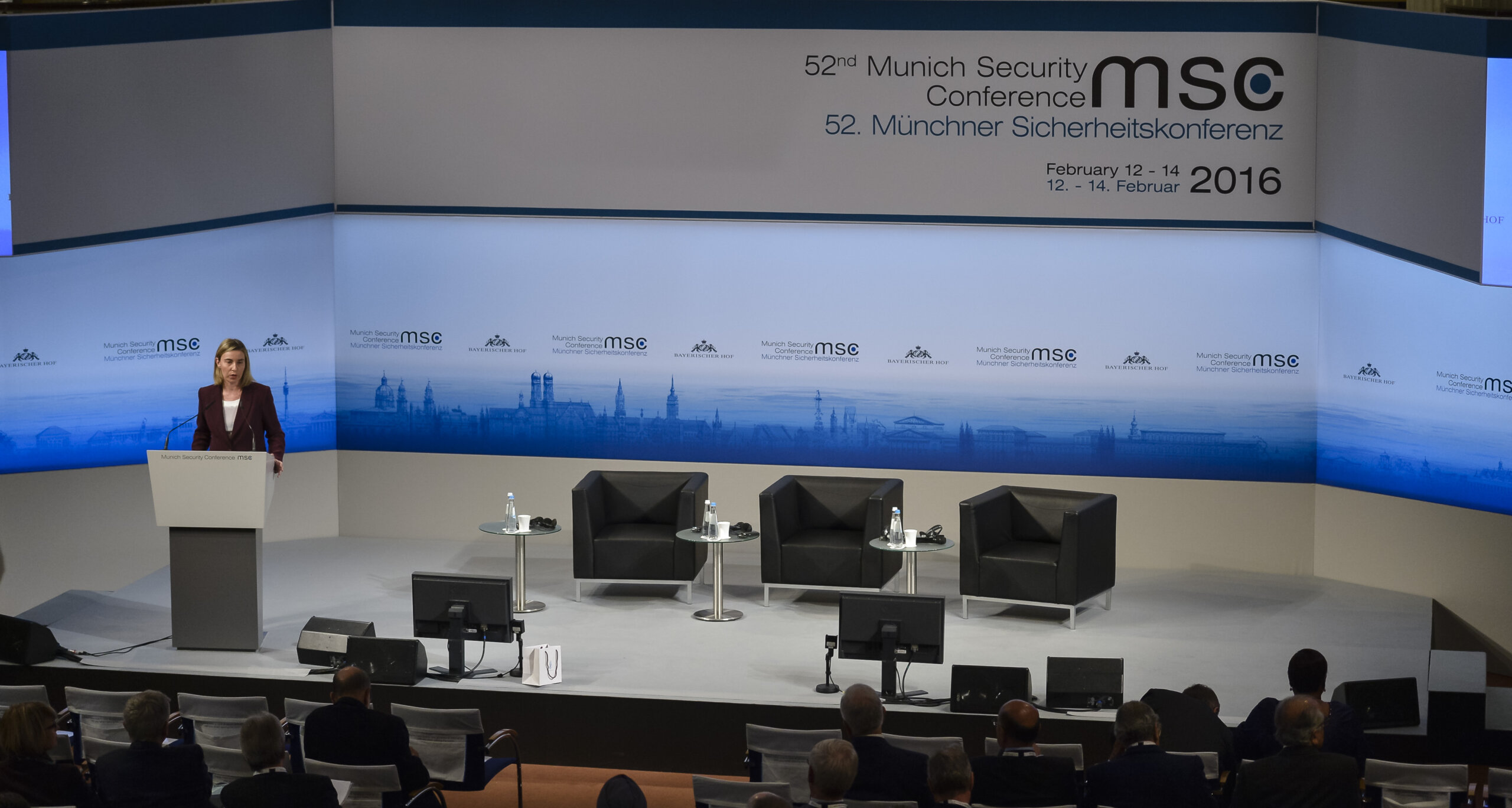The Munich Security Conference is possibly the biggest annual event in the calendar for global elites talking strategic security and stability. This year’s shindig confirmed that the myriad of challenges facing the world is as complex as ever. One issue in particular was vexing delegates: the confrontation between the West and Russia and its implications for NATO’s eastern flank.
Two years after the annexation of Crimea by Russia, there has been little progress in narrowing the chasm between Western and Russian views. They remain stubbornly poles apart. To be sure, Russian Prime Minister Dimitry Medvedev’s Munich speech at times hinted at a desire for conciliation, but the speculation as to whether his mention of a new Cold War was a threat or a call for caution, a depiction of the present or a warning about a possible future, itself shows that both sides are talking past each other. Against this background, NATO’s Secretary General Jens Stoltenberg declared that facing a ‘more assertive Russia’, the Alliance needs ‘to send a powerful signal to deter any aggression or intimidation’. Such a signal will be discussed at NATO’s Warsaw Summit in July, alongside the role conventional and nuclear weapons will have in NATO’s deterrence.
A central question will be whether NATO overturns its understanding with Russia expressed in the 1997 Founding Act, and if so, to what extent. The Alliance affirmed it had ‘no intention, no plan and no reason to deploy nuclear weapons on the territory of new members, nor any need to change any aspect of [its] nuclear posture or nuclear policy’. It also stated it could defend its territory without ‘additional permanent stationing of substantial combat forces’, provided Moscow exercised restraint in its conventional deployments.
Since Russia’s takeover of Crimea and military intervention in Eastern Ukraine, NATO’s easternmost members have accused Russia of nuclear sabre-rattling and flexing of military muscle. At the last NATO summit (Wales 2014), the Alliance adopted a Readiness Action Plan (RAP) to assure frontline allies that NATO was willing and able to defend their sovereignty against Russian aggression. This involved an increased presence of Allied forces in training and exercises, and more active preparations to send reinforcements to the region should a crisis erupt. Recently, the Alliance has decided to further enhance this presence through multinational rotational contingents. The US has sought a constant military footprint in the region through rotational deployments and the pre-positioning of military assets, including heavy hardware. In this regard, this month’s announcement of a fourfold increase in the 2017 budget for the US European Reassurance Initiative (from million in 2016 to .4 billion) is designed to assuage European concerns.
The Baltic states, Poland, Romania and other frontline states have welcomed the implementation of the RAP. However, there are indications that at Warsaw they might want NATO to go beyond the formula of persistent deployments and agree on NATO and US troops permanently stationed on their soil. Poland is especially vocal about this, as shown in a recent op-ed by Polish Foreign Minister Witold Waszczykowsky.
Irrespective of whether the Polish request is accepted by Allies, the adequacy of NATO’s conventional deterrence will come to dominate discussions in Warsaw. A report by the RAND Corporation suggests that the Baltics could fall quickly to an all-out Russian offensive, requiring a highly dangerous counter-offensive or a nuclear threat to reverse such a move.
Whilst interview-based research by CNS clearly shows that this subregional inferiority in conventional capabilities vis-à-vis Russia genuinely worries frontline NATO members, they also have limited confidence in NATO’s nuclear deterrence as a counter-balance, instead believing that NATO should upgrade its conventional capability. The 1997 Founding Act is clearly under pressure and Russian actions have already stretched or broken their own commitments under this arrangement. But it remains crucial that NATO be mindful of the 1997 regime when addressing the nuclear component of its deterrence, and avoid deepening the strategic damage.
Some have called for NATO to assign a greater role to its nuclear forces, and to substantiate that through training (as suggested by British Secretary of State for Defence Michael Fallon). Some have even suggested the deployment of NATO’s B61 tactical nuclear bombs further east. But this fails to address real deterrence needs. The CNS report suggests that assurance of Eastern European allies depends upon conventional deterrence, not nuclear deployments. NATO’s B61s or other options for limited nuclear engagement (the US planned new air-launched cruise missile) are manifestly inadequate as a deterrent; these systems are neither militarily effective nor politically credible. On top of this, investment in nuclear weapons detracts scarce financial resources from conventional capabilities. In trying to keep all options open, the Obama Administration has approved a plan for nuclear modernisation which is unachievable if the US also wants to keep improving crucial conventional capabilities. For example, the European deployment of the B61-12, the latest version of the B61, would cost the US around million per year. The European host-nations (Germany, the Netherlands, Belgium, Italy and Turkey) will have to face substantial costs as well, which is problematic at a time of serious financial constraints.
Beyond these concerns, if the Warsaw Summit strengthens NATO’s commitment to the strategic value of nuclear weapons, it would send an extraordinarily damaging signal regarding its disarmament and nonproliferation goals. If it is good for NATO, why not other states? The wider international community is engaged in a process to examine the legal requirements to ban nuclear weapons, the result of years of inaction by nuclear weapons states and their allies on the disarmament front. Why should other states take NATO security seriously when discussing such a ban if NATO does not consider their security in demanding they foreswear nuclear weapons?
Temptations within the Alliance to expand the role of nuclear weapons will be counterproductive. In Warsaw NATO has a golden opportunity to put nuclear weapons where they belong: on the margins of its deterrence posture. The security of the Alliance deserves no less.
Image: European External Action Service: Munich Security Conference 2016

